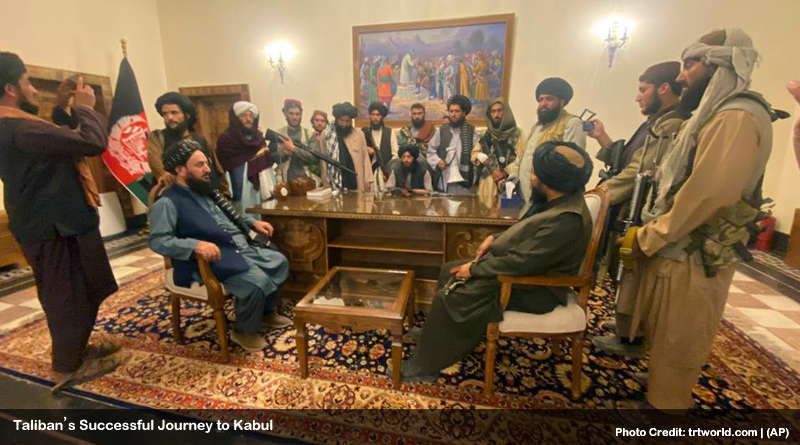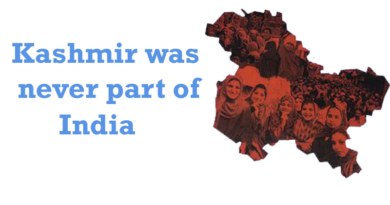Taliban’s Successful Journey to Kabul: 3 Noteworthy Points
Taliban have made it to Kabul, declared an end to war, and are about to form/finalize a government. We note 3 things here with reference to this historic event. The biggest take-away; real winners and losers; is US defeated.
1) The biggest take-away is that for the first time Pakistan took a strategic decision of extra-ordinary geo-strategic importance for Pakistan itself , and successfully followed it through with great competence and determination facing all the wrath from vested interests, particularly the West’s displeasure. Pakistan has been supporting this or that group before, or for that matter, has been embarking on adventures like Kargil, but never before was a clear, a well thought-through and comprehensive strategy visible in all those operations as it comes across in the current one where the strategy has delivered the end product. In the past engagements, Pakistan’s involvement has delivered no good for it; it has served others’ purposes.
2) Winners and losers—–Who won and who lost?
Taliban are clear winners, United States is not the loser, someone else is, and that is India.
a) Taliban are winners because they have stayed put, and won in time, which means that time could not wear them out, and that is the determining factor in the fate of a resistance as this one. Taliban showed great courage, indomitable will and maintained unity and discipline in their ranks. No external support would have helped if that was not the case. They could not be neutralized, and in the end they got what they fought for which makes them winners beyond doubt.
b) India is the real loser, the net loser one must say, over the past 20 years. It invested a lot in Afghanistan, both, politically and economically. There was never a single good reason why it should be doing so. Obviously it was Pakistan-centered—-closing in on Pakistan from Western border. India laid all its eggs in the basket of Afghanistan’s proxy regimes—-Karzai before and then Ashraf Ghani, but ultimately relied on US protective umbrella. Both are gone, India is left in lurch. Living in past and refusing to wake up, India tried to make coalitions with Afghanistan’s neighbours against Taliban who it continued to regard terrorists, but no success. India is out of Afghanistan, and not just that, its narrative regarding Taliban as problem, and not the/part of solution has been debunked globally, not a single country agrees with India on this. It is more than a simple defeat.
In one real sense, India had turned the conflict in Afghanistan into a proxy war against Pakistan. It stands decisively defeated at the hands of Pakistan.
3) Is US Defeated?
United States of Americas is not the loser—not in the sense some people, particularly some simple-minded Muslims would tend to believe. A few points need mention in this regard:
a) The first and foremost thing is that America is not merely a country with whom Taliban were locked into a fight, it is not like India-Pakistan, Azerbaijan-Armenia, where one who does not win is a loser, the defeated. The power equation changes, and the defeated one gets pushed to a position of subservience—real, psychological or both. Here the equation is totally different. US is the political-military leader of a globally dominant political order rooted in the West’s colonial history, and as such its hegemonic power to control the world, formalized through a network of institutions, does not change with ‘defeats’ like the one in Afghanistan. American exit from a place invaded by it does not mean its defeat in black and white terms as it means when one of the two warring countries (Armenia defeated by Azerbaijan is the latest example), is defeated. Remember, US exited Vietnam in 1973 much more humiliated than from Afghanistan, but was it defeated? No, it was not, actually from being one of the super-powers it turned into the only super-power of the world in less than 20 years as its rival the former Soviet Union who had backed the Vietnam resistance(and apparently defeated US there), collapsed.
b) The point to understand is that US military interventions, alone or with cobbled up alliances, are never meant to advance the objectives that it professes to, they are mainly driven by the motive of reinforcing the West’s global hegemony by actual display of its military might, and to demonstrate its will and capability to reach anywhere it chooses to. All good sounding objectives are merely a pretext, never meant. Take Afghanistan’s case for instance. What was US’s goal in coming to Afghanistan in 2001? By their own admission it was to capture late Osama Bin Laden. Taliban shielded him, so they went after Taliban. But then Osama was killed in 2011—-ten years back, so what were US/NATO doing there for the past ten years. We don’t know is the correct answer, no one does. Political analysts can come up with their own assessments, but that is a different thing. This is certain that they had not come to finish Taliban as such, why should they? Taliban wants to establish a strict Islamic regime, but what then? That is none of US concerns, the secular West is concerned with its freedom to single-handedly shape the global agenda to suit its core interests; the local governing systems of countries do not matter. What Taliban wants to establish is already established in Saudi Arabia, and that country is the closest ally of the West, actually the Kingdom is the creation of the West. Saudi arms purchases worth billions keep American economy afloat. So if the American objectives in invading Afghanistan in the first place are suspect, how can we say if it won or lost: Victory and defeat are always defined in relation to the goal. If achieved, success; if not, failure.
c) Now, what is point here in examining the question if America is defeated or not? A very important one: we must get a right sense of what is happening, what the changes on ground in reality mean. If we do not get it right, we cannot develop a proper understanding of the challenges ahead. If we consider America defeated, we will not be able to work toward breaking the colonial hegemony over the still colonized world (so-called post colonial but essentially colonized), and the prevalent political/economic/social systems, and thus really defeat America.
d) One last thing in this connection, the West is in an irreversible decline, this is now a part of global political narrative. US/NATO exit from Afghanistan is yet one more symptom of it, as was US political withdrawal earlier from Syria. Joe Biden upon assuming office proclaimed ‘America is back on the table’ but that is easier said than done: same day he announced American withdrawal from Afghanistan.
About Blogger:
Dr. Syed M. Inayatullah Andrabi is the founder convenor of Mahazi-Islami, Occupied Kashmir. He is an intellectual-political activist from Srinagar, capital city of occupied Kashmir.


